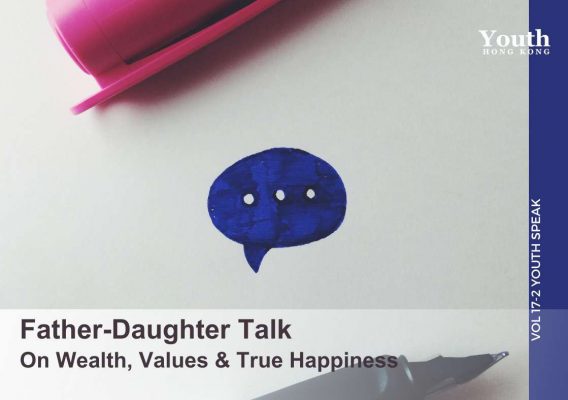A father and daughter talk about the importance of being financially literate.
Xen: I think it is very important for my children to know about money and financial concepts. I started teaching them at quite a young age through a kind of “three step programme,” with the first stage beginning with the simple idea of savings. With their lai see received at Chinese New Year, as well as their allowances, I gave them both piggy banks with the responsibility to look after their own savings.
Metty: You always stressed the importance of managing our savings and telling us to save for a rainy day.
Xen: The second stage was when they could open their own bank accounts. Now, instead of just managing their savings, they had to have the responsibility of managing their expenses. They were teenagers, but I would give them a budget of three to six months and advise them to create three pots: for expenses, savings and investments.
Metty: I am working now and I think this “three pot” exercise is what I try to live by, though the reality is that of my current salary, I put one third towards savings; one third towards rent and a third for expenses. It is out of my savings that I try to invest.
Xen: I appreciate how difficult it is for young people just starting out, but it is the value and philosophy behind financial concepts that is most important. For me, as a father, it is important for the children to learn about expenses and savings. I am most concerned that they learn how to control their spending and not get into debt. I stress the need to maintain at least a three to six month savings equivalent of monthly expenditure, so they will be able to handle any unforeseen circumstances.
Metty: This is something that is well ingrained. I am very aware that I must always have enough saved because you never know when you will suddenly lose your job, or if something unexpected happens which might require a big spend.
Money exists for the purpose of exchanging goods and services. I let my children understand that while money can buy many things, it can’t buy happiness.
Xen: I am glad that you find this important, because I come to my third stage of financial management, investments. This is something that involves more risk. Whether it is insurance, fixed deposits, stocks or crypto, I believe the children can only learn how to act responsibly after they learn how to build a passive income.
Metty: I probably learn the most about financial management from you, and I learn quite a bit about investing from my younger brother. He reads a lot about stocks and how all this works. I have many friends in finance, so I also try to learn from them. The truth is that I need more practical advice, like what to do and how to do it, which I am still working on.
Xen: Personally, my financial knowledge is very basic and limited. I have no doubt that my children will learn everything they want to know online in a matter of seconds. However, I too need to keep myself updated on modern financial technology and topics and so I read and try things out – crypto, digital payments, stocks investments – then share these experiences with them, so that we can learn and discuss together.
What I find more important is the concept of financial values. Money exists for the purpose of exchanging goods and services. I let my children understand that while money can buy many things, it can’t buy happiness. Of course, my kids will argue if they can buy a branded jacket or the latest iPhone, they will be happy. Here is the difference between pleasure and happiness. Pleasures can lead to addiction and pain, but happiness does not because it comes from within you – kind, compassion and loving towards others.
Metty: I agree. While it’s true that money can bring immediate gratification, like buying something you’ve wanted for a long time, long-term happiness is more about the freedom and security that financial literacy provides. It’s about knowing that you can weather life’s uncertainties, support those you care about, and make meaningful choices without being restricted by financial stress. You have always taught me that money is a tool, not a goal, and I think that’s a lesson that will stay with me forever. ■


